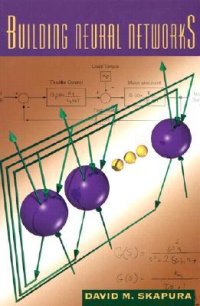
Ebook: Building Neural Networks
Author: David M. Skapura
- Genre: Computers // Cybernetics: Artificial Intelligence
- Tags: machine learning artificial intelligence neural networks feature engineering software engineering backpropagation Hopfield networks associative networks image processing control theory fuzzy logic
- Year: 1995
- Publisher: Addison-Wesley Professional
- Edition: Paperback
- Language: English
- djvu
Neural network theory can be learned with relative ease, yet learning to apply the technology successfully can be a slow, trial-and-error process. In this study, the connectionist model is taught using numerous examples that show how people have built neural network applications.
"This practical introduction describes the kinds of real-world problems neural network technology can solve. Surveying a range of neural network applications, the book demonstrates the construction and operation of artificial neural systems. Through numerous examples, the author explains the process of building neural-network applications that utilize recent connectionist developments, and conveys an understanding both of the potential, and the limitations of different network models. Examples are described in enough detail for you to assimilate the information and then use the accumulated experience of others to create your own applications. These examples are deliberately restricted to those that can be easily understood, and recreated, by any reader, even the novice practitioner. In some cases the author describes alternative approaches to the same application, to allow you to compare and contrast their advantages and disadvantages.
Organized by application areas, rather than by specific network architectures or learning algorithms, Builiding Neural Networks shows why certain networks are more suitable than others for solving specific kinds of problems. Skapura also reviews principles of neural information processing and furnishes an operations summary of the most popular neural-network processing models. Finally, the book provides information on the practical aspects of application design, and contains six topic-oriented chapters on specific applications of neural-network systems. These applications include networks that perform:
Pattern matching, storage, and recall
Business and financial systems
Data extraction from images
Mechanical process control systems
New neural networks that combine pattern matching with fuzzy logic
The book includes application-oriented excercises that further help you see how a neural network solves a problem, and that reinforce your understanding of modeling techniques."
" David M. Skapura is the coauthor, with James A. Freeman, of Neural Networks: Algorithms, Applications, and Programming Techniques. He is currently employed by Brightware Corporation (a spin-off of Inference Corporation), where he works as an applications consultant, developing customized knowledge-based systems and applications. He is also the founder and president of Scient Computing, a small Houston consulting firm specializing in neural-networking applications and research. Previously at Loral Space Information Systems, Skapura investigated the applicability of neural networks to NASA's advanced automation requirements. He is an adjunct professor at the University of Houston at Clear Lake."
"This practical introduction describes the kinds of real-world problems neural network technology can solve. Surveying a range of neural network applications, the book demonstrates the construction and operation of artificial neural systems. Through numerous examples, the author explains the process of building neural-network applications that utilize recent connectionist developments, and conveys an understanding both of the potential, and the limitations of different network models. Examples are described in enough detail for you to assimilate the information and then use the accumulated experience of others to create your own applications. These examples are deliberately restricted to those that can be easily understood, and recreated, by any reader, even the novice practitioner. In some cases the author describes alternative approaches to the same application, to allow you to compare and contrast their advantages and disadvantages.
Organized by application areas, rather than by specific network architectures or learning algorithms, Builiding Neural Networks shows why certain networks are more suitable than others for solving specific kinds of problems. Skapura also reviews principles of neural information processing and furnishes an operations summary of the most popular neural-network processing models. Finally, the book provides information on the practical aspects of application design, and contains six topic-oriented chapters on specific applications of neural-network systems. These applications include networks that perform:
Pattern matching, storage, and recall
Business and financial systems
Data extraction from images
Mechanical process control systems
New neural networks that combine pattern matching with fuzzy logic
The book includes application-oriented excercises that further help you see how a neural network solves a problem, and that reinforce your understanding of modeling techniques."
" David M. Skapura is the coauthor, with James A. Freeman, of Neural Networks: Algorithms, Applications, and Programming Techniques. He is currently employed by Brightware Corporation (a spin-off of Inference Corporation), where he works as an applications consultant, developing customized knowledge-based systems and applications. He is also the founder and president of Scient Computing, a small Houston consulting firm specializing in neural-networking applications and research. Previously at Loral Space Information Systems, Skapura investigated the applicability of neural networks to NASA's advanced automation requirements. He is an adjunct professor at the University of Houston at Clear Lake."
Download the book Building Neural Networks for free or read online
Continue reading on any device:

Last viewed books
Related books
{related-news}
Comments (0)